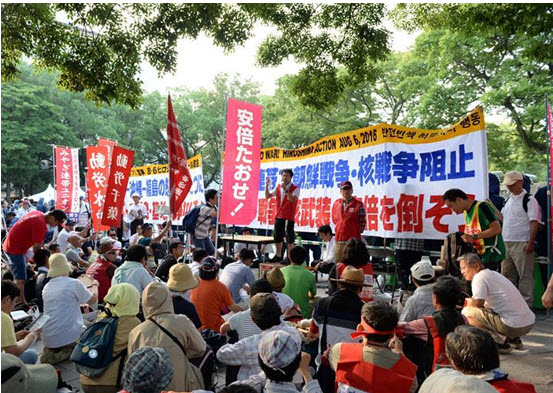Today, humanity has reached a turning point. The old nuclear order, which was created with the dropping of US atomic bombs on the cities of Hiroshima and Nagasaki 71 years ago, has come to a dead end.

Protest held near the Peace Memorial Park in Hiroshima, Japan, August 6, 2016. Hiroshima, the city that suffered the first US atomic bombing in 1945 towards the end of World War II, commemorated the 71st anniversary of its destruction on Saturday at the city’s Peace Memorial Park. (Photo: Xinhua)
This old nuclear order, which arose from the ruins of Hiroshima and Nagasaki and which was enormously expanded and perpetuated throughout the Cold War era and remains in force up until today, can no longer be sustained. In the second decade of the 21st century, humanity will either face a dangerous new nuclear order in which weapons of mass destruction will widely proliferate, or humanity will arrive at a new anti-nuclear order, where no one, without exceptions, will possess such weapons.
The criminal bombings of Hiroshima and Nagasaki were not defensive acts carried out by the US because it faced a threat to its existence. Nor were they used to dictate the present, but rather to mold the future. They were not dropped to defeat Japan (the outcome of the Second World War in the Pacific had already been determined by the time of their use in early August of 1945), but to prevail over the Soviet Union and to shape the post-war world.
Seventy-one years later, over 16,000 nuclear weapons are still stored in the world’s arsenals; maintaining them costs 100 billion dollars annually – funds which could readily be used to deal with climate change, eliminate poverty, and address other social and economic needs.
We have witnessed the failures of the doctrine of “preventive wars,” extreme neo-liberalism, and the brutal strategy of imposing the will of the United States by force. These failures must force humanity to choose between two options: either more and more countries, both willing and capable of doing so, will join the nuclear club; or humanity will choose to live in a world free of nuclear weapons.
What motivates public debate on the nuclear question today are not really the dangers facing countries that possess nuclear weapons, but rather the obsessive desire of these countries to preserve the old nuclear order which arbitrarily grants them a monopoly over nuclear weapons, globally as well as regionally.
What is clear now, and becomes clearer every day, is that more and more forces in the world are challenging the “right” of a handful of states to hold a nuclear monopoly and refuse to submit to this reality. The centers of nuclear tensions throughout the world revolve around nuclear countries that insist on maintaining their monopoly, on the one hand, and countries which are challenging this monopoly, on the other. This insistence on a nuclear monopoly, in the Middle East in particular, jeopardizes the cause of world peace and the well-being of the peoples in the region.
This is especially the case with countries, like Israel, which are not signatories to the Nuclear Non-Proliferation Treaty (NPT) but which threaten disastrous attacks on those nations that aspire to nuclear capabilities. Those who oppose the Iranian nuclear project and wish to stop it cannot turn a blind eye to the extensive Israeli nuclear arsenal without being accused, and rightfully so, of hypocrisy.
The campaign of fear and terror launched by the Israeli government with regard to the Iranian nuclear program and last year’s Nuclear Deal between the US and Europe with Iran is not meant to end any authentic existential threat to Israel, but to prepare public opinion for a war of aggression, aimed at maintaining the Israeli nuclear monopoly in the Middle East.
The real challenge for all concerned parties in the Middle East and throughout the world following the Nuclear Deal with Iran is to rise to the occasion and use the debate on the Iranian nuclear project to open up the nuclear question in the Middle East as a whole. The initiative should be taken to dismantle all weapons of mass destruction (WMDs) in the region, put pressure on Israel to sign the NPT, and implement confidence-building steps to stop the armaments race, establish a nuclear-free zone in the Middle East, and abolish all plans to develop WMDs in the region.
Issam Makhoul
Issam Makhoul, a former Hadash MK, is the director of the Emil Touma Institute for Palestinian and Israeli Studies and a member of the Political Bureau of the Communist Party of Israel. A version of this article was posted on the Hiroshima Peace Media Center website, at www.hiroshimapeacemedia.jp, and also appeared in Japanese in the newspaper Chugoku Shimbun.


